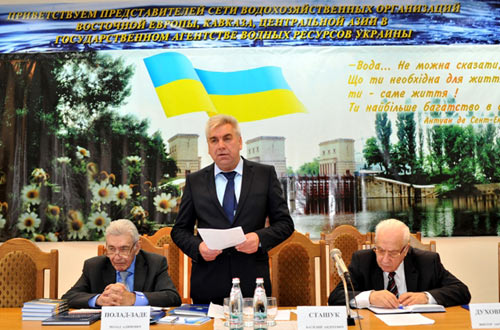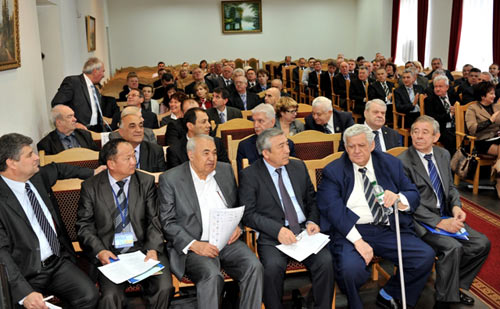Conference of the Network of (Basin) Water Organizations from Eastern Europe, Caucasus and Central Asia (NWO EECCA)
«Challenges and Progress in Water Management and Land Reclamation in EECCA Countries»
7 November 2012, Kiev, Ukraine
During the Forum Aqua Ukraine 2012, the Conference of the Network of Water Organizations from Eastern Europe, Caucasus and Central Asia was held at the museum complex “Bortnitchi” named after N.A.Garkushi. The participants - members of the Network and representatives of Ukrainian organizations (about 100 people in total) - have visited museum of this complex and laid wreaths on the Garkushi’s memorial.
The participants were welcomed by V.A. Stashuk, Chairman of the State Water Resources Agency of Ukraine and P.A.Polad-Zade, President of the Network.


The following reports were presented:
History, Problems and Prospects of Ukrainian Water Sector Development - Vasily Stashuk, Chairman of the State Water Resources Agency of Ukraine, corresponding members of the Ukrainian Academy of Sciences
New Tendencies in the World Water Community and Their Impact on Water Development in the Region - Victor A.Dukhovny, Executive Secretary of NWO EECCA, Director of Scientific-Information Center of the Interstate Coordination Water Commission of Central Asia, Ph.D., Professor
UNECE Water Convention and Integrated Water Resources Management - Bo Libert, Regional Adviser for Environment, UN Economic Commission for Europe
Russia’s Water Sector - Scientific Grounds for the Advancement - Nadezhda B.Prokhorova, Director, Russian Research Institute for Integrated Water Use and Protection, Ph.D. in economics, Professor
Program for Rehabilitation and Development of the Reclamation System in Russia - Nikolay A.Sukhoy, Chairman of the Russia’s Union of Water and Land Reclamation Professionals
Water Strategy in Ukraine, Characteristics of IWRM in Ukraine - Mikhail I. Romaschenko, Director, Institute of Water Problems and Land Reclamation, member of National Academy of Sciences, Ph.D.
Challenges and Prospects of Water Resources Management in Azerbaijan - Mamed S.Kuliev, First Deputy Chairman, Public Corporation «Land Reclamation and Water Management of Azerbaijan»
Experience of IWRM Implementation in Kazakhstan - Ondasyn Ye. Zhienkulov, Deputy Chairman, Committee for Water Resources, Ministry of Agriculture, Republic of Kazakhstan
Issues of Transboundary Governance in Chu-Talas Basin - Nurgazy P.Mamataliev, Director of the Kyrgyz Branch of Scientific-Information Center, Interstate Coordination Water Commission
Integrated Water Resources Management in Uzbekistan - Ravshan A.Mamutov, Deputy Head of Central Water Resources Administration, Ministry of Agriculture and Water Resources, Republic of Uzbekistan
Modeling Large Basins: Syrdarya Case-Study - Makhmud Kh. Khamidov, Head of Basin Water Organization «Syrdarya»
Transboundary Aquifers of Belarus and Riparian States - Mikhail Yu. Kalinin, International State Environmental University named by A.D.Sakharov, Professor, Ph.D.
Water Capacity Building Activity of the Global Water Partnership for Central Asia and Caucasus - Vadim I. Sokolov, Regional Coordinator, GWP CACENA, Deputy Director Scientific-Information Center of the Interstate Coordination Water Commission of Central Asia
Experience in Water Cooperation between Moldova and Ukraine in Transboundary Dniester River Basin - Ilya D. Trombitskiy, Executive Director, “Eco-Tiras” International Environmental Association of Dniester River Guardians
Reduction of Vulnerability to Extreme Floods and Climate Changes and Other Areas of Cooperation between Moldova and Ukraine on the Dniester Basin - Anna A.Plotnikova, National Project Officer, OSCE
Reforms in Water Management in the Republic of Armenia over Last Decade - Araksya Davoyan, Deputy Head, Water Resources Management Agency, Ministry of Nature Protection, Republic of Armenia
Basin Principle of Water Resources Management in Seversk Donets River Basin - Ways for Optimization - Victor Ye.Antonenko, Head of Seversk Donets Basin Water Management Administration
About Support by the German Agency for Technical Cooperation of the Network of Water-Management Organizations from EECCA in 2013-2014 - Jenniver Sehring, Consultant, Deutsche Gesellschaft fur Internationale Zusammenarbeit (GIZ) GmbH
Prof. V.Dukhovny in his report stated lines of further development of NWO EECCA.
Dr. V.Sokolov, regional coordinator of GWP for Caucasus and Central Asia, presented joint actions for strengthening exchange of information and dissemination of best practices, especially on IWRM.
Representatives of most countries - Network members - underlined positive changes in the development of national water sectors in Azerbaijan, Armenia, Belarus, Kazakhstan, Kyrgyzstan, Russia, and Uzbekistan.
At the same time, a number of problems related to insufficient financing of water sector were identified. Serious concerns regarding situation in the water sector in Russia were expressed by the Head of the Union of Water and Land Reclamation Professionals Mr. N.Sukhoy.
Mr. B.Libert, Regional Adviser for Environment from UNECE, who presented his report, Mr. D.Valensuela, Deputy Permanent Technical Secretary of the International Network of Basin Organizations, and Ms. J. Sehring, Consultant from GIZ participated also in the Conference.
Finally, the participants adopted the following resolution.
Resolution of the International Conference of (Basin) Water Organizations from EECCA
Participants of the International Conference of (Basin) Water Organizations “Challenges and Progress in Water Management and Land Reclamation in EECCA Countries” gathered in Kiev on the 7th of November 2012 having discussed the reports presented by the Network’s President, academician P.A.Polad-Zadeh, Executive Secretary of the Network Prof. V.Dukhovny, Chairman of the State Water Resources Agency of Ukraine V.Stashuk, UNECE representative B.Libert and speeches of participants from Azerbaijan, Armenia, Belarus, Kazakhstan, Kyrgyzstan, Moldova, Russian Federation, Uzbekistan and Ukraine stressed high significance of information exchange and best practices dissemination within the framework of the Network of water organizations from EECCA. Systematic information by the Network’s members about activities undertaken for improvement of water governance and management in their respective countries, implementation of integrated water resources management, new technological solutions, provision of announcements about new publications, program and methodological products, as well as about training materials allow expending perspectives of local water professionals and contribute to progress in national water sectors in NIS. At the same time, the participants note that along with certain improvements in water sectors of EECCA countries, particularly the significant increase of attention to access to water and sanitation, the increase of areas under advanced water systems using drip irrigation, SCADA, etc. especially in Ukraine, Uzbekistan, and Kazakhstan, there are also common shortcomings for all the countries:
- Lack of interaction between various agencies in water resources management area;
- Abrupt reduction of irrigated areas – by 6 million ha!!!
- Deterioration of accounting and reporting system in area of water use in a number of countries;
- Cut of government investments in water management and land reclamation;
- Loss of integrity of water sector’s structure as a separate economic sector (except for some countries) and continuing changes: water sector inside agriculture or nature use sectors;
- Increase of water localism and hydro-egoism;
- Decrease in water productivity;
- Sharp reduction of annual operating costs on irrigated and reclaimed lands - from 60 $/ha (1990s) to 8-10 $/ha (at present).
Under such conditions, of importance is further development of the network, first of all, in form of strengthening of national centers of NWO EECCA and their better equipping and involvement in their activities of water-management, academic and non-governmental organizations as much as possible in order to create a public platform for water sector improvement and overcome problems and challenges that the global water society faces, taking into account regional specifics.
Transboundary cooperation is of special importance in implementation of IWRM. UNECE Water Convention is an exceptional factor for the development of transboundary cooperation. The participants underlined 20th anniversary of the Convention and its openness to the whole world in 2012-2013.
The Conference proposes:
1. To make provisions for the following as first-priority measures:
1.1. Organization of active national centers of NWO EECCA, with selection of initiative young leaders, in all the countries, including main partner organizations.
1.2. Organization of survey, generalization and analysis of main indicators and trends in water development, including:
- Inventory of existing academic and sectoral research institutions, available innovations and developments, their implementation systems, and look for possibilities for their dissemination;
- Best practices and their dissemination;
- Availability of national water strategies and their correspondence to the European Water Framework Directive.
1.3. Exchange of information needs to be organized in the following directions:
- Status of water resources (quantity and quality);
- Integrated water management and use;
- Water use economy;
- Restoration and protection of water resources;
- Prospective use of transboundary water objects;
- Quality of water resources and ways to improve it, experience in eco-servicing;
- Development of information systems, including electronic databases on water quantity and quality; reliability of data in information systems;
- Hydrological and water-management modeling;
- Environmental safety of water use;
- Systems of water accounting and regulation in river basins;
- IT in water sector and implementation of SCADA;
- Training, life-long learning, professional development;
- International water law, its development and enforcement;
- National water legislations.
1.4. Organization of distance learning (e-learning):
- Identify major training directions;
- Organize workshops on important issues in form of training of trainers;
- Publish training materials;
- Prepare young leaders and establish their network inside NWO EECCA.
1.5. Organization of conferences and mix workshops.
1.6. Promotion of greening of national water sectors in member countries through integration with forestry, improvement of economic activity management in basin areas for water accumulation by ecosystems and adaptation to climate change.
2. Taking into account:
- available unique theoretical and practical basis in the area of water management and land reclamation, as well as experience in implementation of IWRM and advanced solutions developed together with foreign institutions in organizations that are the membership of NWO EECCA,
- great demand for dissemination of such experience and knowledge for new generation of professionals and water users,
the Conference recommends initiating preparatory work for establishment within the framework of NWO EECCA of a knowledge centers network.
Its aim is to support development in the NIS space of the single system of knowledge centers that meet the world and European requirements regarding classification and unification of information products and is dedicated for serving water-management and land reclamation organizations and extension services. This system, being created by using common principles on a single methodological basis, will provide wider opportunity to pave the “direct way” from available scientific innovations to end users. In this context, the Network’s President should prepare relevant proposals for their submission to donors for financing and assign coordinators.
NWO EECCA is collaborating with the Global Water Partnership for Caucasus and Central Asia in this direction.
3. Apply to donors’ community, particularly to the Federal Agency for the Commonwealth of Independent States, Compatriots Living Abroad and International Humanitarian Cooperation (Rossotrudnichestvo) and to German Society for Technical Cooperation (GIZ) and ĹuropeAid for financial support of capacity development and network extension.
4. The participants thanked UNECE for support and assistance in financing events of the Network and for opportunity to organize this Conference, as well as the chairman of the Ukrainian Agency for Water Resources Prof. Stashuk for a warm welcome and excellent arrangement of the Conference.
|